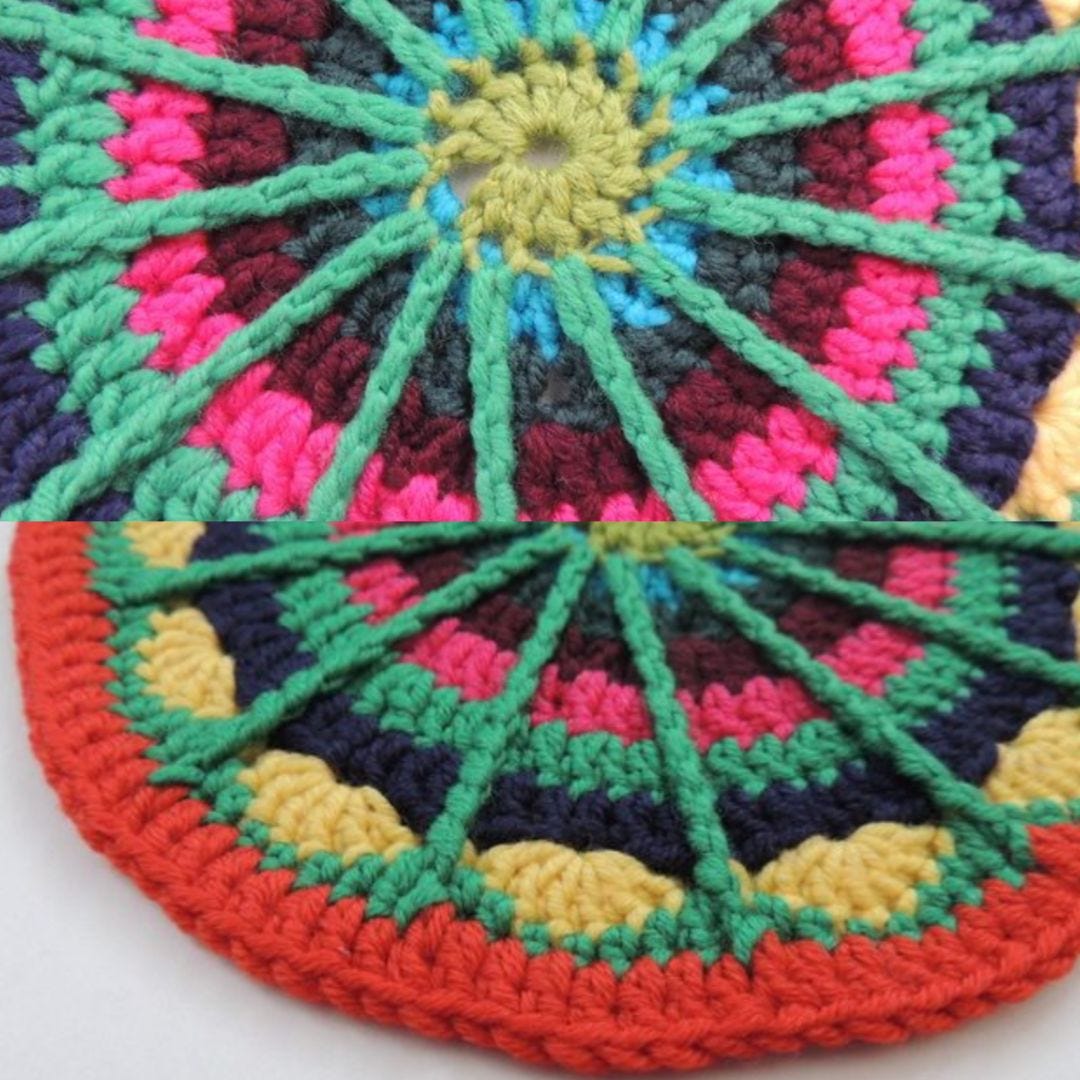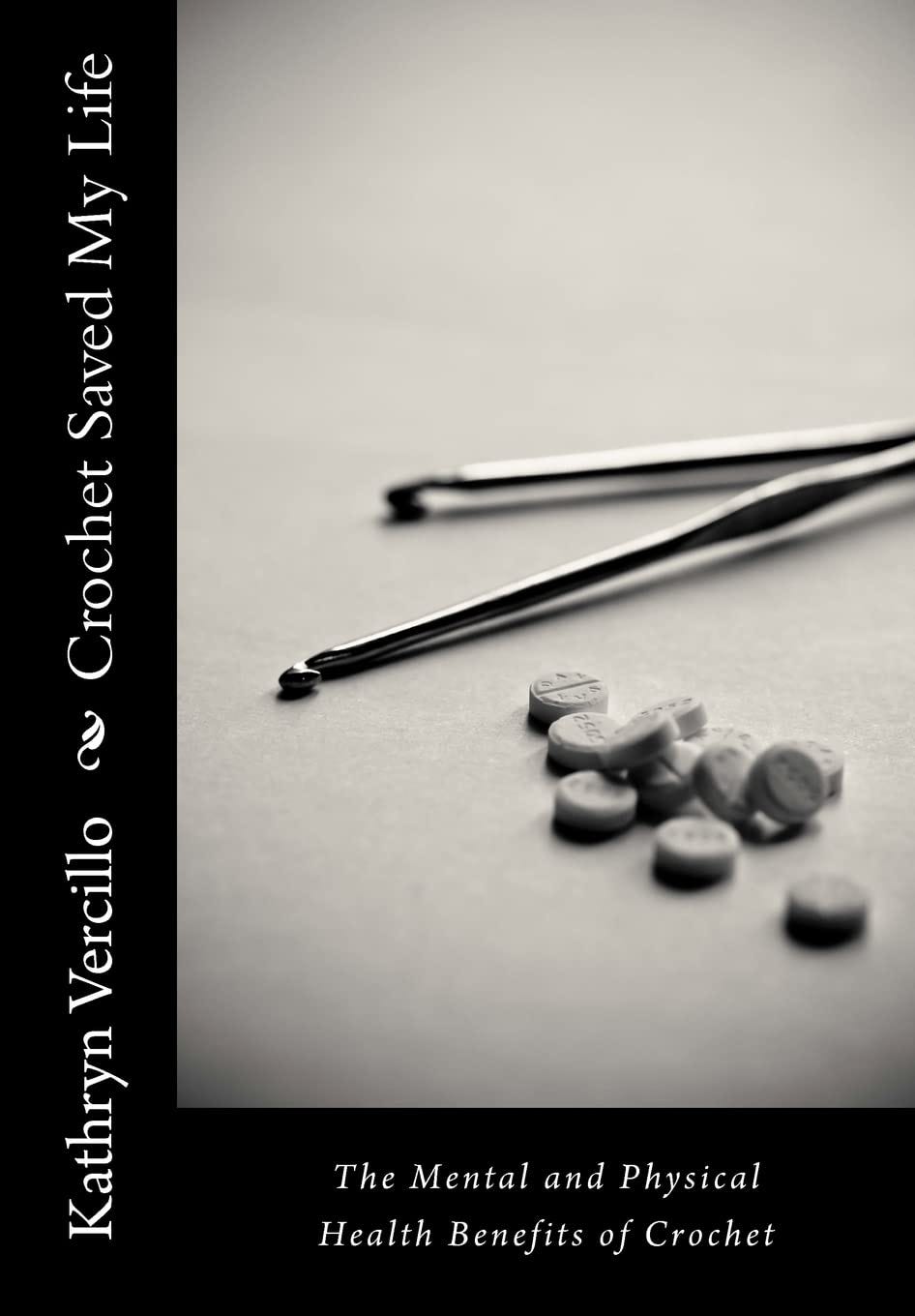5 Crocheters on Depression, Suicide, and Crafting to Heal
Sharing the work of other artists or the work inspired by their work can be a way of continuing their legacy which may be healing for whole communities
As I shared recently, the 2015 Mandalas for Marinke collaborative crochet art project to raise awareness about depression, suicide, and crafting to heal is one of the projects I’m most proud of. And I believe its message matters, so I’m sharing some portions of it this year - mostly on Instagram but also here. You’ll meet the crafters, read their words, see the mandalas, read a variety of depression/mental health information and learn how it all relates to the work I’m doing today.
Meet the Makers
In this section, you’ll meet the five makers who contributed these crochet mandalas to the original project along with their own words if they shared them …
This crochet mandala was made by Monika in Germany who shared:
"Several years ago I read the book Crochet Saved My Life. Being in a bad condition, feeling worthless after mobbing at work, I was impressed by all of those stories and how they women fought for their life and happiness. And how Wink contributed to the happiness of other crocheters with her astonishing patterns. I'm so sad. May she rest in peace and may her family and friends find consolation."
This splendid crochet contribution came from Deborah, also known as Snowcatcher who shared:
"I've battled depression most of my life, and I've lost two loved ones to suicide. I've been the recipient of unfair and unkind judgment while I've been in the deepest and most hopeless abyss. I want to do all I can to help raise awareness of depression in the hope that others won't have to go through what I have been through. I hope this project will help others extend the hand of kindness and arms of friendship towards those who are suffering, and I hope those who are suffering will be able to find and really feel joy."
From an anonymous contributor in the UK:
I think it's very important to recognize that people are in different stages of their own life stories and sometimes wish to remain anonymous or partially anonymous when participating in projects such as this. I believe wholeheartedly that people should honor their own needs when it comes to the ways in which they share.
From Jude in Ontario, Canada
who didn’t choose to share anything in words
From Sara Elin Roberts who shares:
"I am an academic, a medieval historian; I live in Anglesey, North Wales with my two boys. Crafting keeps me sane."
And she adds:
"I have not been crocheting long but I found Wink's blog while looking for a Mandala pattern - and I made several of her mandalas. Her tone was so lovely and cheerful, and so I started following her blog a year or more ago. She just seemed so ... happy.
I have suffered from depression - once during pregnancy; and then after a difficult period. It is hard to explain but life stops.
I wanted to contribute because Wink's patterns are so wonderful and I want her to continue through her work."
Which is precisely why I not only created the Mandalas for Marinke project but also am sharing it again now, eight years later …
Resources, Quotes, Inspiration … Raising Awareness About Depression and Suicide
One major purpose of this project was to raise awareness about depression, suicide, mental health, and crafting to heal. At the end of each original blog post, I shared a quote, a resource, or related information. Here is what I shared from each of the five posts above.
An excerpt from an article by Victoria Connell written for Rebelle Society about her battle with depression.
I chose this excerpt because it reflects how I personally have felt at times as someone living with chronic, recurring depression.
"Depression feels like a parasite that latches on to your inner fire. It feeds off of your light and love, slowly diminishing it. At first you fight it with all you’ve got. You stoke the fire and call for help. You forcefully try to pull it out, getting angry with yourself and the cards you’ve been dealt. You ignore it for a while, hoping it will burn up on its own if you just refuse to acknowledge its power. With all of your preparations, all of your self-love and growth, you think it’s just a scare, there’s no chance the Depression will win again. And suddenly it does. You wake up one morning, or realization sets in on another drive home from work; in one unremarkable moment, the fire goes out. You feel dead. Nothing matters and you could not care less of what becomes of life. Leaving you to pick up the pieces of the person you thought you had finally become; having to start all over again. Or quit."
Read the rest of the original post, which ends: “And where there is life, there is hope.”
On The Stigma of Depression
There are many reasons for the stigma of depression but in general people tend to hold a negative view of those with any type of mental illness. Lewis Wolpert has a great article about how people struggling with depression can often seem unreliable, irritable and difficult, causing those in their lives to feel frustrated, angry and hopeless, in a perpetuating cycle that leads to further stigma. It also leads to self-stigma, with the depressed person feeling shame, a feeling that can cause further depression.
There are different types of depression stigma. In addition to self-stigma, there is "anticipated stigma (where someone presupposes the way in which they might be perceived or treated), treatment stigma (the perceived implications of seeking or receiving treatment)" and the experience of stigma when mistreated by someone else because of our depression.
All of the links here elaborate on this concept and were chosen because I felt they had something more to say on the topic. It's a big topic and one I'll likely touch on again. But for now I'll refer to an article by Elizabeth Shimer Bowers that discusses ways to counter stigma, ways that include getting social support, educating people about depression, avoiding isolation, facing your own stereotypes and avoiding self-blame.
On depression diagnosis:
Did you know that major depression can be diagnosed after just two weeks of symptoms? Many people find this surprising because depression is often such a persistent problem and can go a long time, years even, without being diagnosed. However, the official criteria for major depression requires that symptoms are persistent for most of the day, nearly every day, for at least two weeks in a row. Long-term depression that lasts for at least two years is called Persistent Depressive Disorder (formerly called dysthymia).
There are many different forms of depression, even within the single category of major depression. The diagnosis means that you have either a depressed mood and / or anhedonia (loss of interest). Plus you have to have at least five additional symptoms which may include weight change, sleep change, restlessness, fatigue, feelings of worthlessness, indecisiveness and thoughts about death. A specific diagnosis made by a professional requires very strict criteria but that's the gist of it (based on my academic knowledge of the DSM and my personal knowledge as someone treated for depression.
Some of the physical symptoms of depression:
Today I wanted to highlight the physical symptoms of depression, which include:
Chronic pain. This can include back pain, chest pain, joint pain and muscle pain.
Digestive problems. Stomach issues of all kinds including indigestion nausea can be a symptom of depression.
Headaches, including migraines. You may also feel dizzy or lightheaded.
Issues related to appetite and/ or weight. More hungry, less hungry, food cravings, weight loss, weight gain.
Issues related to sleep. Insomnia and oversleeping are both symptoms of depression.
Total exhaustion. John F. Greden, M.D., the executive director of the University of Michigan Comprehensive Depression Center, quoted in an article about depression, says, "That 3 p.m. slump you feel when you need your third cup of coffee hardly compares to the drop in energy that occurs when you're in a depressed state. Because of this lack of motivation, depression can sometimes make you feel like your muscles don't work."
It is important to realize that any and all of these symptoms can be symptoms of something else other than depression as well. I, personally, have experienced some of these symptoms in relation to both low thyroid and anemia, each of which also actually cause the feeling of depression. It's all kind of tied together. I bring this up today not so that you can diagnosis yourself with depression but so that you can recognize some of the taxing physical experiences you might be dealing with when you're going through depression.
It's important to be gentle with yourself, recognizing that you may need more rest and more time for basic self-care attention when you are living with depression.
Quick tips for daily habits that you can cultivate to help offset depression:
Get enough sleep. I know from personal experience that this can be hugely difficult because, as mentioned above, depression often causes insomnia. However, if you can, get enough sleep. Take naps as needed. At the very least, take time to rest.
Eat right. It's not always easy to do but eating a well-balanced nutritional diet, making sure to get enough of all of your daily vitamins, can go a long way towards improving your mood even as you live with depression. If you're on meds, take them properly. If they aren't working, work with your doctor/healer/community to find what does.
Drink water. Avoid caffeine and alcohol. I'm absolutely guilty of not abiding by this simple, important tip. I drink coffee every morning and I rarely get enough water. But I'm working on it because I know that it helps.
Keep a daily journal. You might find it helpful to vent your feelings and emotions. You may feel better if you write lists of what you are thankful for. Or you may just want to jot notes each day on how you're feeling and why you might be feeling that way.
Meditate or pray. I once heard a talk from a Muslim woman who said that her favorite part of the religion is that she stops to pray for peace five times per day. She said that even if she didn't believe in any other part of her faith, she thinks her own personal world would change just by pausing five times per day and focusing on peace. Prayer and meditation can take many forms, even the form of mindful crochet (which I write about in both Crochet Saved My Life and Hook to Heal), and can be hugely healing.
Let people know how you are feeling. Check in regularly with the people who love you. Tell them when you're up and when you're down. This helps because it's a form of social connection and it also helps because these people might notice symptoms of depression in you before you notice them yourself.
Obviously, these are small, simple tips. Everyone’s journey is different, everyone’s needs at any given time are unique, but these are starting points for things that typically tend to help most people if you’re able to do them.
Art and Mental Health Takeaways
Mandalas for Marinke came out of the 10+ years I spent studying crochet as therapy, which evolved into the work I do now, which looks at all art as therapy and catharsis but also at the shadow side of how mental health impacts creativity. I wanted to look back at these original posts with an eye towards the related takeaways:
Storytelling makes a difference; the stories people share about their challenges and resilience are themselves an art form that can inspire others
Sometimes it’s important to stay anonymous when creating because your mental health state isn’t right for sharing under your name; that’s totally okay
Contributing creatively to raise awareness about issues that are of concern to you can provide purpose
Sharing the work of other artists or the work inspired by their work can be a way of continuing their legacy which may be healing for whole communities
Depression can cause chronic and acute pain, digestive issues, problems with sleep and total exhaustion, all of which can negatively impact creative productivity and inspiration
If you read this far, perhaps you liked the work. The work does take work. It only continues with support, so please consider subscribing. My annual rate starts at $10 per year.














